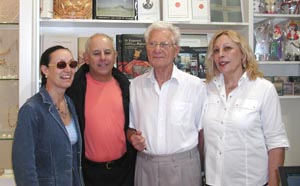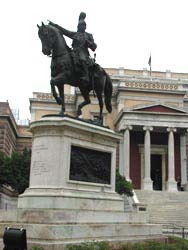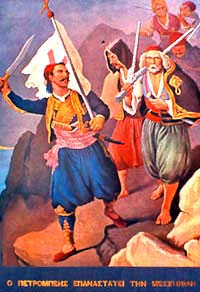
|
National Historical Museum of Greece Donates Books for Special Collection at University of New Hampshire |
Mr. Mazarakis-Ainian, on behalf of the museum and the Historical and Ethnological Society of Greece, presented a large collection of research materials and books for distribution to a Modern Greek studies program, the Hellenic Communication Service website, and Hellenic Historical and Genealogical Association, both not-for-profit entities. Among the collection were critically acclaimed texts by noted experts and professors in Greece, as well as museum-quality slides of some of the national treasures of the museum. The donated books will become part of the Paideia of New Hampshire Special Collection at the University of New Hampshire in support of the Greek Studies programs there.
As a result of this cooperative venture, the Christos and Mary Papoutsy Charitable Foundation pledged to continue to support such internationally based endeavors. The mission of the foundation is to support worthy projects, especially those concerning Hellenism, Greek Orthodoxy, and Hellenic culture. Personal participation is the cornerstone of all CMPCF activities: “Only by participating can we ensure the health, dignity, freedom, and creativity of our society.” Among the current funds and activities of this umbrella foundation are the Foundation for the Revitalization of Vatoussa, Lesvos, the Christos and Mary Papoutsy Endowed Chair in Business Ethics at Southern New Hampshire University, the Professor John C. Rouman [Roumanis] Classical Lecture Series at the University of New Hampshire, the Hellenic Historical and Genealogical Society, and Hellenic Communication Service, a free news and information service. Mr. Mazarakis-Ainian, a highly esteemed scholar and expert, is the author of a number of seminal books and articles about Greek history and culture. In addition to his prestigious position with the National Historical Museum, he is the Secretary General of the Historical and Ethnological Society of Greece, and the Greek representative of the European Council of History Museum, a branch of the International Association of Museums of History.
The museum houses permanent and temporary exhibits, publishes scholarly texts and materials, conducts educational and scientific activities, supplies materials to researchers, and carries out historical research through cooperation with similar organizations. Maintenance of the museum and the organization of its activities are just a few of the activities of the Historical and Ethnological Society; the group also operates a research library, a research laboratory, an historical archive, and an annex facility housed in the historic Lazaros Kountouriotis Mansion on Hydra. Surrounding the central Chamber of the old Parliament are exhibition rooms whose artifacts chronicle the history of Modern Greece from the 16th to the 20th century. Each room concentrates on different facets of Neo-Hellenic history: The Fall of Constantinople 1453, the Turkish Occupation—Frankish Occupation, Preparation for
Museum hours are Tuesday through Sunday, 9 am to 2 pm. There is a nominal admission fee on weekdays and Saturdays (3 Euros), with reduced entry for students. On Sundays admission is free. Viewers may request additional information from the museum directly: National Historical Museum, Old Parliament Building, Stadiou Street, 105 61 Athens, Greece; (tel.) +30-210-32.37.617 or (fax) +30-210-32.13.786; email nhmuseum@tee.gr. The Hellenic Ministry of Culture maintains webpages for the museum at http://www.culture.gr/4/42/421/42103/42103e/e42103e1.html. The Foundation for the Hellenic World also offers webpage space to the museum and society, permitting visitors to take a virtual reality tour of the museum at http://www.fhw.gr/projects/vouli. |
Greek Independence Day Commemorative Series
Paideia to Etch Greek in Granite
University of New Hampshire Moves Towards Four-Year Program in Modern Greek
|




